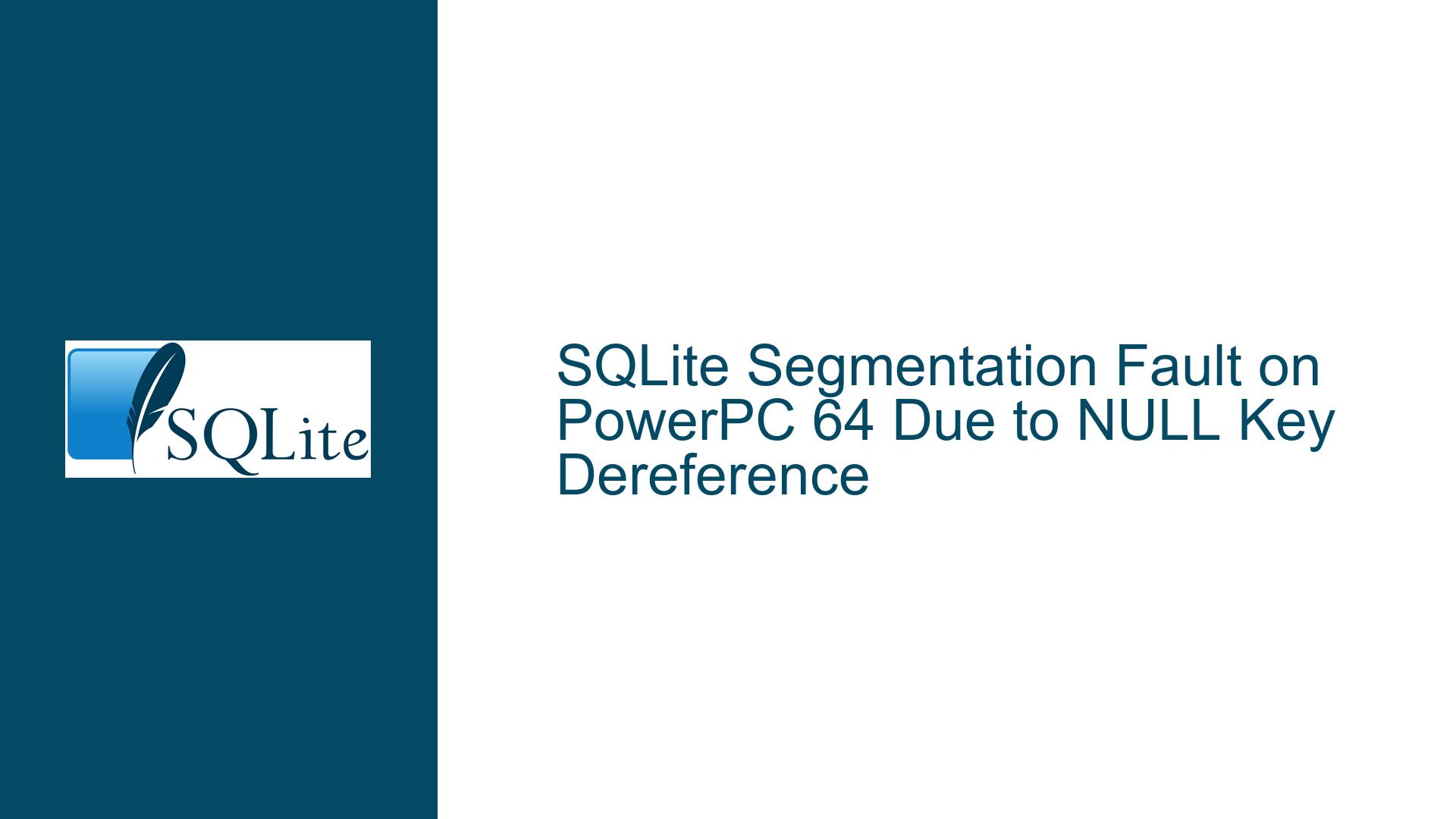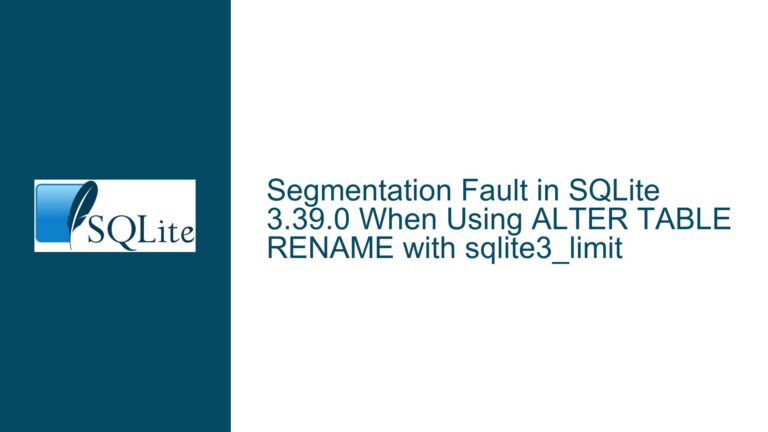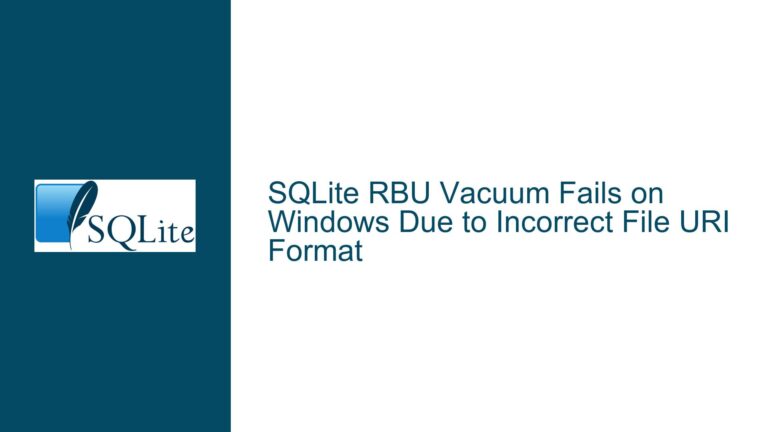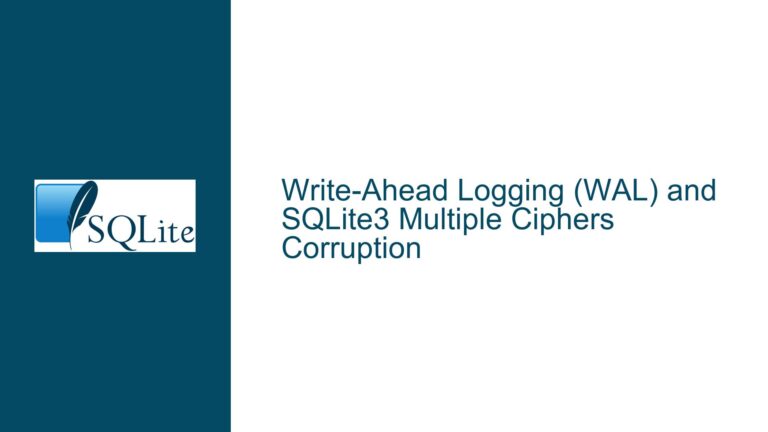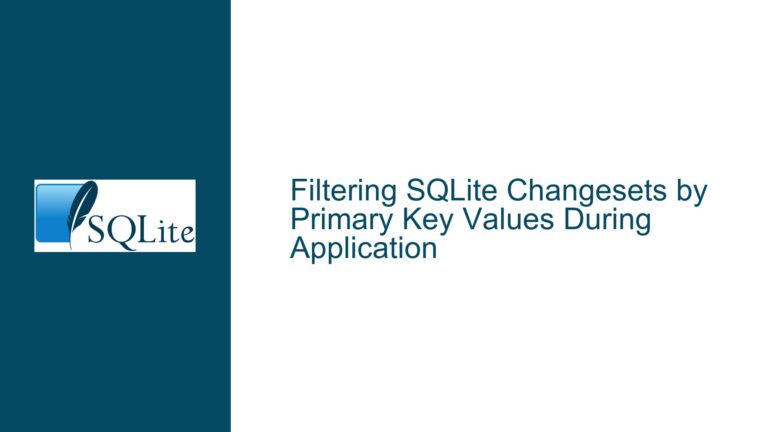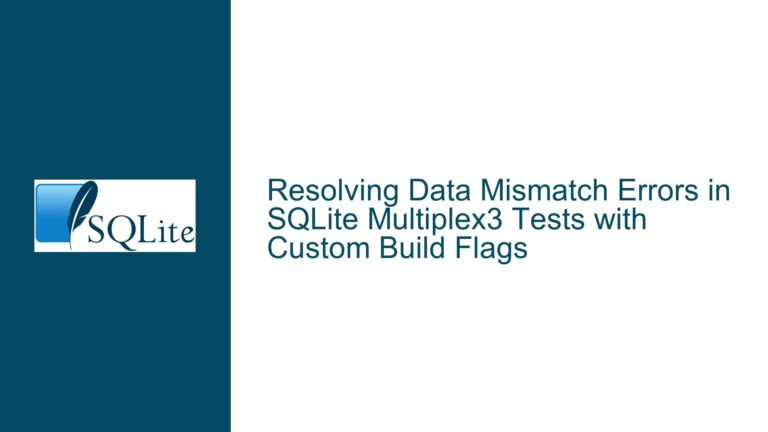SQLite Segmentation Fault on PowerPC 64 Due to NULL Key Dereference
SQLite Segmentation Fault in sqlite3VdbeRecordUnpack on PowerPC 64
The core issue revolves around a segmentation fault occurring in the sqlite3VdbeRecordUnpack function within SQLite, specifically on PowerPC 64-bit architectures running in big-endian mode. The fault manifests when the function attempts to dereference a NULL pointer (aKey), which is passed as an argument to the function. This issue was first observed in SQLite version 3.30.1 and is particularly problematic in environments where optimizations are enabled, making debugging more challenging.
The function sqlite3VdbeRecordUnpack is responsible for unpacking a binary record into a more accessible format for SQLite’s internal operations. The function takes four parameters: a pointer to KeyInfo (which describes the record format), an integer nKey (the size of the binary record), a pointer pKey (the binary record itself), and a pointer to an UnpackedRecord structure (where the unpacked data will be stored). The segmentation fault occurs because pKey is NULL, and nKey is 0, leading to an attempt to dereference aKey, which is derived from pKey.
The fault is triggered in the following line of code:
idx = getVarint32(aKey, szHdr);
Here, aKey is a pointer derived from pKey, and since pKey is NULL, any attempt to dereference aKey results in a segmentation fault. The issue is exacerbated by the fact that the function does not handle the case where pKey is NULL and nKey is 0 gracefully. Instead, it proceeds with the assumption that pKey points to valid memory, leading to the crash.
NULL Key Dereference Due to Unhandled Edge Case in sqlite3VdbeRecordUnpack
The segmentation fault is caused by an unhandled edge case in the sqlite3VdbeRecordUnpack function. Specifically, the function does not account for the scenario where both pKey is NULL and nKey is 0. This situation can arise in certain contexts, particularly when dealing with empty or invalid records. The function assumes that pKey will always point to a valid memory location, which is not always the case.
The function begins by casting pKey to a const unsigned char* and assigning it to aKey:
const unsigned char *aKey = (const unsigned char *)pKey;
If pKey is NULL, aKey will also be NULL. The function then proceeds to call getVarint32(aKey, szHdr), which attempts to read from aKey. Since aKey is NULL, this results in a segmentation fault.
The issue is further complicated by the fact that the function does not perform any checks to ensure that pKey is non-NULL or that nKey is greater than 0 before attempting to dereference aKey. This lack of validation makes the function vulnerable to crashes when dealing with invalid or empty records.
Additionally, the issue may be related to the handling of big-endian architectures, such as PowerPC 64. The function may not correctly handle the byte ordering of the binary record on big-endian systems, leading to incorrect behavior when unpacking the record. This could result in pKey being set to NULL or nKey being set to 0 in certain scenarios, further exacerbating the issue.
Implementing Proper NULL Key Handling and Big-Endian Support in SQLite
To resolve the segmentation fault, the sqlite3VdbeRecordUnpack function must be modified to handle the case where pKey is NULL and nKey is 0. This can be achieved by adding a check at the beginning of the function to ensure that pKey is non-NULL and nKey is greater than 0 before proceeding with the unpacking process. If either condition is not met, the function should return early without attempting to dereference aKey.
The following code snippet demonstrates how this check can be implemented:
SQLITE_PRIVATE void sqlite3VdbeRecordUnpack(
KeyInfo *pKeyInfo, /* Information about the record format */
int nKey, /* Size of the binary record */
const void *pKey, /* The binary record */
UnpackedRecord *p /* Populate this structure before returning. */
){
const unsigned char *aKey = (const unsigned char *)pKey;
u32 d;
u32 idx; /* Offset in aKey[] to read from */
u16 u; /* Unsigned loop counter */
u32 szHdr;
Mem *pMem = p->aMem;
/* Early return if pKey is NULL or nKey is 0 */
if (pKey == NULL || nKey == 0) {
p->default_rc = 0;
return;
}
p->default_rc = 0;
assert( EIGHT_BYTE_ALIGNMENT(pMem) );
idx = getVarint32(aKey, szHdr);
...
}
This modification ensures that the function does not attempt to dereference aKey if pKey is NULL or nKey is 0, preventing the segmentation fault.
In addition to handling the NULL key case, the function should also be updated to properly support big-endian architectures. This can be achieved by ensuring that the byte ordering of the binary record is correctly handled when unpacking the record. The following table outlines the necessary changes to support big-endian architectures:
| Change | Description |
|---|---|
| Byte Order Handling | Ensure that the byte ordering of the binary record is correctly handled when unpacking the record on big-endian architectures. |
| Varint Decoding | Update the getVarint32 function to correctly decode varints on big-endian systems. |
| Memory Alignment | Ensure that the memory alignment of the UnpackedRecord structure is correct for big-endian systems. |
By implementing these changes, the sqlite3VdbeRecordUnpack function will be able to handle NULL keys and properly support big-endian architectures, preventing the segmentation fault and ensuring correct behavior on PowerPC 64 systems.
In conclusion, the segmentation fault in sqlite3VdbeRecordUnpack on PowerPC 64 is caused by an unhandled edge case where pKey is NULL and nKey is 0. By adding proper checks for NULL keys and ensuring correct handling of big-endian architectures, the issue can be resolved, preventing the segmentation fault and improving the robustness of SQLite on PowerPC 64 systems.
